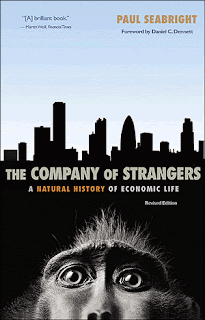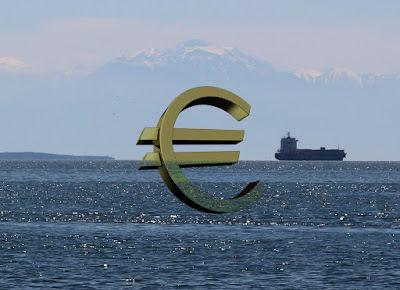Book review: The Company of Strangers
“The Company of Strangers” (2004, Princeton University Press)
In a very rich and lively book, Paul Seabright, an economist from the University of Toulouse, explains how human beings have evolved from an ordinary animal species to a highly organised society through what he calls “The Great Experiment”. This experiment consists in the building of social and economic institutions and Seabright shows that our subsequent evolution has little to do with genetical or biological evolution. These institutions – mostly embedded in the modern state via some core principles: army, law enforcement, property rights,… - have made it possible the development of markets by nurturing trust and allowing specialisation. Trust and specialisation are linked to each other because one cannot specialize in what she does best if she doesn’t trust that others will provide her with everything else she needs to live.
Specialisation has grown to such a high level that the manufacturing and delivery of a new shirt now involves workers and techniques in over 20 countries. Similarly trust is now so widespread in our society that, paradoxically, “someone may feel comfortable lending money to a foreign banker she has never met, but hesitant to lend money to the man in the next-door apartment.”
Here are a few extracts I found particularly spicy:
- Stealing and banking
“Banks have probably been created before money as storehouses. Their transformation into proper banks may even have been the fruit of deceit, the ingenuity of a warehouse owner who realized that he could lend out some of the grain he was storing on others' behalf without the knowledge of its owners.”
- Why are Japonese companies are bigger than Chinese ones (HK, Taiwan and Singapore)
“Because in-laws have their say in family decisions and allow family firms to grow faster”
- “You could fit all your direct ancestors (for a man, father of father...) going back 10,000 years in a local hall”
- The role of information spreading in current markets:
"Every village in a poor country is an information island. This does much to explain why decades of foreign aid have made so much less impact on poverty in the developing world than optimists about global integration have hoped."
- On the European Union:
“The popular modern view that trade between neighbours makes warfare less likely (a view central to the establishment of the European Union) is one that has no reliable basis in history”
- Exploitation of the great by the small:
“There is a systematic tendency for ‘exploitation’ of the great by the small. Members who are economically powerful, gaining a significant share of the benefits of the public goods, would tend to make large contributions, thereby further diminishing the already low willingness of weaker members to make any contribution at all.”



Here is a note that I just received from the author:
ReplyDelete"its second edition has just appeared in May 2010, much revised and updated (20% more material) including a new chapter on the financial crisis."